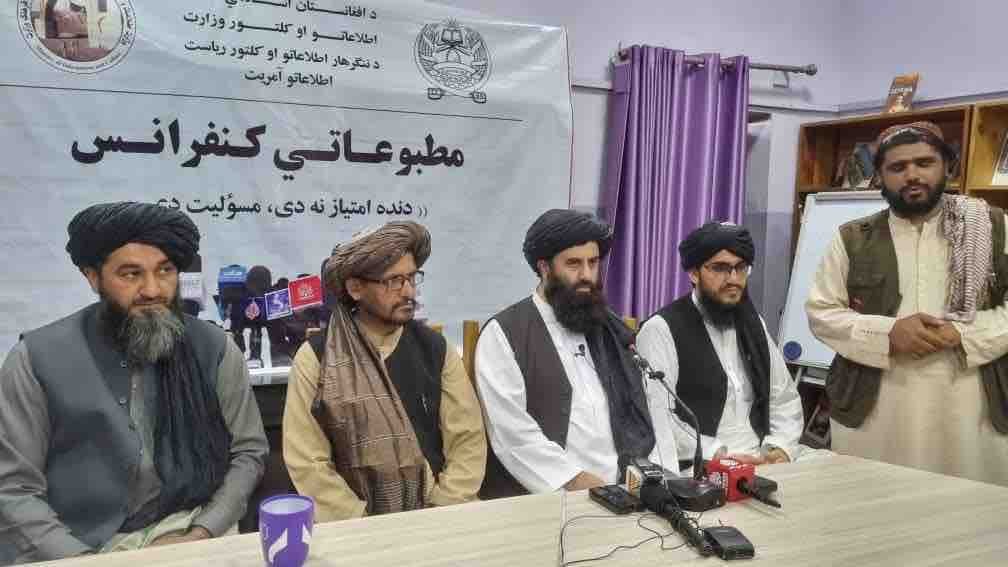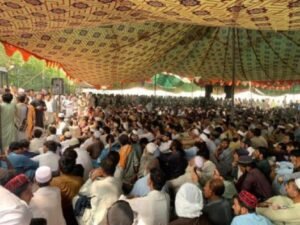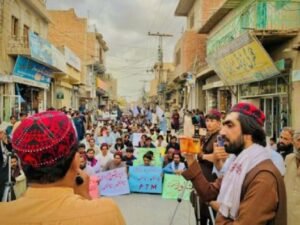Afghan Hopes Dashed: Taliban Rule Strays Far From People’s Aspirations

A group of Taliban provincial authorities in eastern Afghanistan during a reporting press conference - July 2023. Photo: @private
Ilhamuddin Afghan
Since the Taliban retook power in Afghanistan in August 2021, their actions have been directly at odds with the aspirations and hopes of the Afghan people. In the beginning, people believed that the Taliban would uphold justice and security and ensure that the people were happy with their rule. The truth, however, has been very different. Many Afghans now believe that the Taliban acted with impunity and without repercussions, treating the nation as their own winning prizein the war against the U.S.-led international troops.
Having lived through two decades of democracy, Afghans have long yearned for a democratic system. There is still a strong demand for a system that guarantees every Afghan’s right to education, employment, easily accessible healthcare, and an open and transparent legal system. The current de facto government, according to Abdullah, a graduate student from the University of Law and Political Science, does not adequately represent the wishes of the Afghan people. Abdullah believes that just because the U.S. forces helped the Taliban rise to power does not imply that they are a legitimate government. He claims that the group has no real plans for forming an inclusive government and reform and is merely carrying out a foreign agenda. Despite the changing circumstances, the Afghan people’s desire for a democratic and accountable system remains a motivating factor.
During a recent televised debate in Kabul, Afghan lawyer Abdul Hakim Dadras made a startling remark about the Taliban government. He firmly expressed, “I cannot refer to the Taliban’s governance as a legitimate and legal system or government. The Taliban’s lack of responsibility to the people and their inability to withstand legal scrutiny in a court of law. The Taliban’s lack of legitimacy and inability to comply with the principles of a legitimate government.”
Dadras emphasized the lack of transparency and a conciliatory attitude while highlighting the absence of rights and obligations under the Taliban’s rule. Instead, he pointed out that the group imposes a form of tyranny over the people and primarily focuses on its own interests.
The lack of accountability is evident in the way the Taliban appoint their own members to key positions, disregarding the qualifications and merits, and needs of the country. While they reward their own members with extra pay and positions, ordinary employees struggle to make ends meet with meager salaries. The sense of justice that the Taliban claims to uphold is perceived as hollow, as they show favoritism towards their own group and neglect the well-being of ordinary citizens.
During a conversation with the author, an employee of the Taliban’s government named Samandar shared his story. He said, “I work in a lower position, the sixth grade and make 7,000 Afghanis (less than 100 USD) a month, but that is not enough to support my family of eight.” Samandar said that a large number of his coworkers who currently hold lower positions in the agency where he works were holdovers from the previous government.
The difficulties faced by government employees in the current environment are highlighted by Samandar’s account. Samandar and other people who are supporting large families face financial difficulties as a result of the gap between salaries and the rising cost of living. In addition, the fact that people from the previous government are still in lower-level positions begs questions about the workforce’s overall composition and how that may affect the effectiveness and productivity of governmental institutions.
All spheres of society are affected by the Taliban’s rule, with people in markets and villages experiencing financial hardship and abuse as well. The public feels frustrated and disenfranchised due to the lack of transparency and the inability to criticize the Taliban’s actions. Many believe that external influences have caused Afghanistan’s greatness and identity to be lost and that the Taliban’s actions have only made matters worse for the Afghan people.
An Afghan named Wafa wrote on Twitter: “The ruling authorities lack an Afghan identity. Others (referring to Pakistan)have an impact on our nation politically, administratively, and militarily. We no longer possess the traditional Afghan character or stature in the world. As part of an enemy’s plan, the ruthless and unscrupulous Taliban subject the Afghan people to daily suffering.
The Taliban’s mistreatment has even alarmed the locals and shoppers in the local markets. A rickshaw driver bemoans the fact that since the Taliban took control, their wages have both vanished and the Taliban are unfairly taking their money as bribe. The public and the media are unable to confront the Taliban about their actions, despite the fact that they occasionally host meetings in the name of transparency and accountability and present their reports from some selected government institutions.
Overall, the Afghan people are deeply dissatisfied with the Taliban’s actions. They long for a system that reflects their true aspirations, one in which access to justice, a quality education, a job, and healthcare are all considered fundamental rights. The people’s hopes for a peaceful and prosperous Afghanistan are not reflected in the current situation, which is tainted by the presence of the brutal Taliban.
Ilhamuddin Afghan is a university professor based in Afghanistan.
Note: The contents of the article are of sole responsibility of the author. Afghan Diaspora Network will not be responsible for any inaccurate or incorrect statement in the articles.






